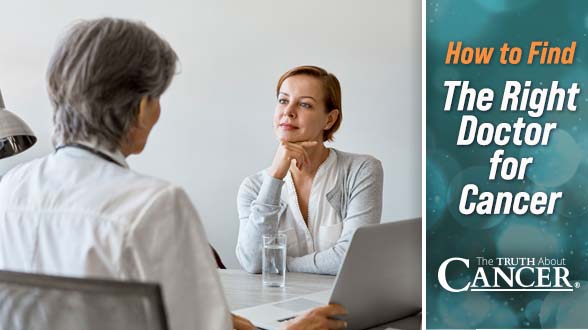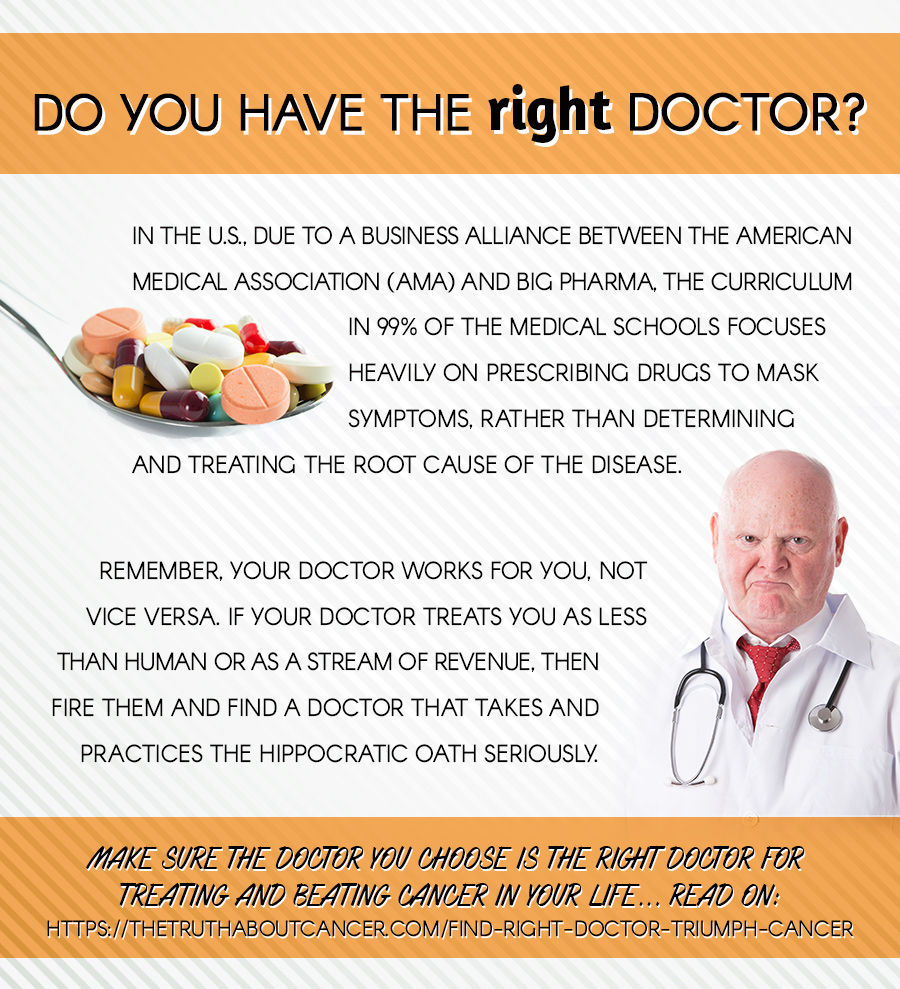When you are diagnosed with cancer, one of the first things you should do is find the right doctor. There are several different types of doctors. Since you are battling cancer, you’ll want to look specifically for a cancer doctor, and one you can trust and who is knowledgeable about how to heal the human body. But more than just searching for a cancer specialist, you should find a doctor who treats their patients as human beings, rather than revenue generators.
Why Finding the Right Cancer Doctor Matters
Cancer is oftentimes a terrifying illness that sends you on a roller coaster of emotion. From the day you’re given the news, your mind may experience fear, anger, and depression.
There will be issues regarding insurance and meeting the financial demands of your healthcare. Concerns for your family and the future will add to the emotional toll. Worry about potential outcomes and dealing with unknown factors will generate many questions. You have the right to expect your questions to be properly addressed.
No one should be kept in the dark and simply believe “the doctor knows best” when it comes to an illness that has claimed the lives of so many. Be prepared to speak up, ask questions, and get the answers you need from your doctor.
The best cancer doctors understand how to treat you as a whole person − not just another appointment to rush through their exam room so they can get to the next file. There are many things to consider before you trust a stranger with your life.
The Road to Becoming a Doctor
Naturally, selecting a qualified doctor is an important first requirement. It takes a lot of work to become a doctor and yours will have put in the time, energy, and financial resources to make that happen.
A physician’s journey includes a four-year premedical education in a university or college, a four-year medical school education, and a two-year internship. Each doctor spends a period of time as a resident in a hospital setting to become accustomed to working with patients. Finally, they take the medical board exam. Each country or state has its own rules for licensing physicians.
What Is a Cancer Doctor Called?
Many people wonder what kind of doctor treats cancer. The physicians who have expertise in cancer treatment are called oncologists. Doctors who specialize in oncology and other specific fields are required to continue their education. The education and training to become an oncologist (a doctor who treats cancer patients) can take 12 years or longer.
In addition, especially for a doctor who treats cancer, there are ongoing education requirements through the years that they practice medicine. Their exams encompass the area of their “specialty.” They may also choose a sub-specialty such as radiation oncology, medical oncology, surgery, or hematology.
By the time your doctor sees you in their office, they have invested many years of their life to obtain the education required to treat you. All that education, all that effort, and all the money invested still might not make them the right doctor for you, because doctors treat their patients with the protocols to which they have been exposed. And medical schools in the U.S. teach drug intensive medicine − a “pill for every ill.”
Unfortunately, in the U.S., due to a business alliance between the American Medical Association (AMA) and Big Pharma, the curriculum in 99% of the medical schools focuses heavily on prescribing drugs to mask symptoms, rather than determining and treating the root cause of the disease. This is a much more profitable business model and sadly, patients suffer as a result of ineffective therapeutics. This is especially evident in the cancer industry, where patients are typically treated with chemotherapy, radiation, and/or surgery. Oftentimes, the patients die from the horrifically toxic treatments rather than the disease itself.
The Truth About Your Cancer
If you’re reading this article, more than likely you’re aware that the medical community might not be giving you the truth about how to fight cancer effectively on all fronts.
In fact, you don’t know if your doctor is receiving payments to push specific cancer drugs (which often happens). Such cases of “supplemental” income are becoming the source of great debate in the health industry. Political candidates must show whom they are affiliated with but doctors are not required to reveal their affiliations.
You might not be a person or even a patient to some doctors. You might be nothing more than a monetary bonus. Does that seem extreme?
How many times have you seen television ads for medications, only to have them prescribed to you or someone you know within weeks? How easily can you receive a prescription for an antidepressant today as opposed to 20 or even 10 years ago? How often have you received refills with almost no questions about side effects, overall health, or actual improvement?
Sales commissions and cancer drugs work the same way. Pharmaceutical companies have invested billions of dollars to push their drugs to market and they offer lucrative perks when doctors choose to use their products.
Take “Big Pharma” out of the picture. Does your doctor believe in alternative or complementary medicine that can be used in tandem with or instead of traditional treatments? Are they willing to “think outside the box” – especially if you or your loved one has a particularly aggressive cancer?
Is your doctor willing to talk about your diet, your environment, or other health issues you may have and how they may help or hinder your recovery?
The Bottom Line When Choosing a Cancer Doctor
You have to be confident and comfortable with your chosen specialist since you will discuss everything with them regarding your cancer treatment. Trust your instincts.
Cancer is a journey into extreme emotional, physical, psychological, and financial stress. Having a doctor who sees you, talks to you and listens to you, will make the journey easier.
If you or a loved one has been diagnosed with cancer, you need to find a doctor. No matter what, you’re going to need one, because cancer is a dangerous disease that cannot be ignored.
Make sure the doctor you choose is the right doctor for treating and beating the cancer in your life.
Remember, your doctor works for you, not vice versa. If your doctor treats you as less than human or as a stream of revenue, then FIRE him and find a doctor that takes and practices the Hippocratic Oath seriously.
Article Summary
When you’re diagnosed with cancer, one of the first things you should do is find a doctor you can trust and who is knowledgeable about how to help people heal.
Cancer can send you on a roller coaster of emotion. You may experience fear, anger, depression, and worries over finances.
Even though it takes around 12 years to become a cancer doctor (aka oncologist), don’t simply believe “the doctor knows best” when it comes to your illness. Be willing to speak up and get your questions answered to your satisfaction.
Unfortunately, medical school in the U.S. teach drug intensive medicine − a “pill for every ill.”
Does your doctor believe in alternative or complementary medicine that can be used in tandem with or instead of traditional treatments? Are they willing to “think outside the box”?
Remember, your doctor works for you, not vice versa. If your doctor treats you as less than human or as a stream of revenue, then FIRE him and find a doctor that takes and practices the Hippocratic Oath seriously.





















I agree with Dawn Would like to know if any doctors Australia.
That did not tell me how to find the right doctor for cancer. I don’t want a regular medical doctor who prescribes chemo and/or radiation.
How do I find a doctor who can help me beat colon or anal cancer? Or do you have some recommendations for beating colon or anal cancer?
I have been learning about Urotherapy. It sounds awful but its really not bad like you would think. Check it out online. I first heard about it at the Truth About Cancer conference this past October 2021.
A very informative article about the absolute TRUTH and more people should and must be aware of this but so sad to say it is all intentionally covered up by the industry.
“Remember, your doctor works for you, not vice versa. If your doctor treats you as less than human or as a stream of revenue, then FIRE him and find a doctor that takes and practices the Hippocratic Oath seriously.”
I think it’s fair to say that some (possibly many) doctors have compassion and actually give the impression that their patient is important however, that’s what makes it difficult unless one knows what to look for to discern whether our doctor views us as a statistic or revenue. Often they give an impression that they care which can make it challenging. If they didn’t care, word would quickly spread and their patient load would decrease. But that’s where it gets challenging. Because they appear on the surface to be compassionate they remain beholden (brainwashed) to what they were taught in medical school. Consequently, they deeply believe in the treatments they advocate and use. They’re well-meaning but deeply deceived.
This is why it’s so important to bring a friend or family member with us when we see a doctor who has a good understanding of conventional vs integrative medicine and act as a mirror, take notes and ask questions. The patient is usually experiencing anxiety and fear after hearing they have cancer. Hence, their reasoning is not clear or objective. They need someone they trust who will provide objective feedback either at the appointment or afterward. That requires discernment and observation of where a doctor is coming from particularly when that physician really believes that what he/she has been taught in medical school is the best.
A friend or family member can listen and observe the doctor’s behavior, attitude and remember things that the patient misses. the truth usually surfaces at some point during the appointment. They can later offer their observations which is what happened when my friend was diagnosed with Stage 0 ductal cancer. I accompanied her when she saw the surgeon. She chose the surgeon she did because she heard he had a great reputation and was excellent in his field. His specialty was breast cancer surgery. She trusted what others in the conventional medical field had told her.
The appointment was enlightening as I quietly observed and listened. On the surface, the surgeon was very nice and treated my friend with compassion but when I later asked if she could wait a short time so she could think about everything and process it all his reaction revealed what he REALLY believed. He didn’t have her best interests at heart but pushed for surgery and radiation ASAP. According to him, waiting would allow the cancer to spread.
The problem with that thinking is that by the time we’re diagnosed with cancer, the cancer has usually gone undetected for many years so waiting another few weeks would not change that nor would it lessen her chances of survival. It might be wise and give her time to get a second opinion (hopefully) from an integrative oncologist. Unfortunately, the surgeon believed that the quicker she acted the better her chances for survival. That was my sign indicating he was more interested in the revenue, and not her as a person. It had NOTHING to do with compassion.
Furthermore, Stage 0 is not even considered cancer in many countries. At that early stage, there are alternative methods that one can do to prevent it from growing and spreading. Unfortunately, because she was fearful, she wasn’t thinking clearly and despite my pleas to wait, she went ahead with his suggestions. Two years later, she was diagnosed with a more aggressive form of breast cancer. At that point, to my disappointment, she didn’t hesitate to do radiation and chemo.
As crazy as it sounds, with the way cancer rate are exploding, it may not be such a bad idea to think ahead and put together a list of doctors/oncologists and other pertinent information ahead of time so that if, God forbid, we’re ever diagnosed, much of the stress associated with finding the right doctor will be eased (it won’t be eliminated entirely) if we have the essential information readily available.
I lost my mother and sister both to Melonoma cancer I really believe that the oncologist poisoned them both with the treatment they where both having as the oncologist knows that chemotherapy and radiotherapy treatment isn’t the answer to treating Melonoma cancer 💔😭 it’s actually making it worse on the patient who is fighting the cancer it’s weakens the immune system so one cannot any longer fight it’s poisons our bodies it’s not the cancer that kills it’s the treatment.
This blog article brings up “How to find the RIGHT CANCER DR” but doesn’t give ANY Tips or anything on how? WTH? Wonder if this website can give any real guidance? When you’ve got cancer? You don’t have time to read this entire blog hoping to find real treatments. Possibly could be a waste of time and cause you to DIE while looking for the right answers. Unbelievable
This article did not provide any real leads or direction on where to find a quality oncologist/cancer doctor that can offer the type of care they show in their docu-series interviews. Where can patients and caregivers go to find real cancer doctors that won’t push chemo/radiation and have success in treating patients naturally? Thank you.